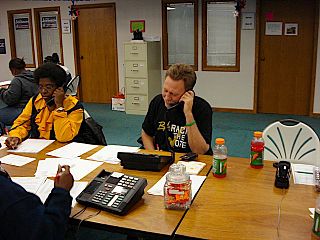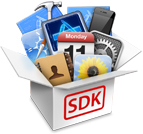
Adobe Flash is a discontinued multimedia software platform used for production of animations, rich internet applications, desktop applications, mobile apps, mobile games, and embedded web browser video players.
The Jerky Boys are an American comedy act from Queens, New York City, New York, whose routine consists of prank telephone calls and other related skits. The duo was founded in 1989 by childhood friends Johnny Brennan and Kamal Ahmed. After Ahmed left the act in 2000, the Jerky Boys continued on as a solo act featuring only Brennan, before going on a 19-year hiatus after the 2001 release of the franchise's penultimate album, The Jerky Tapes. Brennan released a follow-up album of new material in November 2020.

Telemarketing is a method of direct marketing in which a salesperson solicits prospective customers to buy products, subscriptions or services, either over the phone or through a subsequent face to face or web conferencing appointment scheduled during the call. Telemarketing can also include recorded sales pitches programmed to be played over the phone via automatic dialing.
Interactive voice response (IVR) is a technology that allows telephone users to interact with a computer-operated telephone system through the use of voice and DTMF tones input with a keypad. In telephony, IVR allows customers to interact with a company's host system via a telephone keypad or by speech recognition, after which services can be inquired about through the IVR dialogue. IVR systems can respond with pre-recorded or dynamically generated audio to further direct users on how to proceed. IVR systems deployed in the network are sized to handle large call volumes and also used for outbound calling as IVR systems are more intelligent than many predictive dialer systems.

A telephone call or telephone conversation, also known as a phone call or voice call, is a connection over a telephone network between the called party and the calling party. Telephone calls started in the late 19th century. As technology has improved, a majority of telephone calls are made over a cellular network through mobile phones or over the internet with Voice over IP. Telephone calls are typically used for real-time conversation between two or more parties, especially when the parties cannot meet in person.

A telecommunications relay service, also known as TRS, relay service, or IP-relay, or Web-based relay service, is an operator service that allows people who are deaf, hard of hearing, deafblind, or have a speech disorder to place calls to standard telephone users via a keyboard or assistive device. Originally, relay services were designed to be connected through a TDD, teletypewriter (TTY) or other assistive telephone device. Services gradually have expanded to include almost any real-time text capable technology such as a personal computer, laptop, mobile phone, PDA, and many other devices. The first TTY was invented by deaf scientist Robert Weitbrecht in 1964. The first relay service was established in 1974 by Converse Communications of Connecticut.
Phone fraud, or more generally communications fraud, is the use of telecommunications products or services with the intention of illegally acquiring money from, or failing to pay, a telecommunication company or its customers.
A Rich Internet Application is a web application that has many of the characteristics of desktop application software. The concept is closely related to a single-page application, and may allow the user interactive features such as drag and drop, background menu, WYSIWYG editing, etc. The concept was first introduced in 2002 by Macromedia to describe Macromedia Flash MX product. Throughout the 2000-s, the term was generalized to describe browser-based applications developed with other competing browser plugin technologies including Java applets, Microsoft Silverlight.

Caller ID spoofing is a spoofing attack which causes the telephone network's Caller ID to indicate to the receiver of a call that the originator of the call is a station other than the true originating station. This can lead to a display showing a phone number different from that of the telephone from which the call was placed.
Voice phishing, or vishing, is the use of telephony to conduct phishing attacks.
Virtual queue is a concept used in both inbound call centers and other businesses to improve wait times for users. Call centers use an Automatic Call Distributor (ACD) to distribute incoming calls to specific resources (agents) in the center. ACDs hold queued calls in First In, First Out order until agents become available. Virtual queue systems allow callers to receive callbacks instead of waiting in an ACD queue.
A robocall is a phone call that uses a computerized autodialer to deliver a pre-recorded message, as if from a robot. Robocalls are often associated with political and telemarketing phone campaigns, but can also be used for public service, emergency announcements, or scammers. Multiple businesses and telemarketing companies use auto-dialing software to deliver prerecorded messages to millions of users. Some robocalls use personalized audio messages to simulate an actual personal phone call. The service is also viewed as prone to association with scams.
Telemarketing fraud is fraudulent selling conducted over the telephone. The term is also used for telephone fraud not involving selling.

The iOS SDK, formerly the iPhone SDK, is a software development kit (SDK) developed by Apple Inc. The kit allows for the development of mobile apps on Apple's iOS and iPadOS operating systems.
A prank call is a telephone call intended by the caller as a practical joke played on the person answering. It is often a type of nuisance call. It can be illegal under certain circumstances.
Agent-assisted automation is a type of call center technology that automates elements of what the call center agent 1) does with his/her desktop tools and/or 2) says to customers during the call using pre-recorded audio. It is a relatively new category of call center technology that shows promise in improving call center productivity and compliance.

"Thoughts on Flash" is an open letter published by Steve Jobs, co-founder and then-chief executive officer of Apple Inc., on April 29, 2010. The letter criticizes Adobe Systems' Flash platform and outlines reasons why the technology would not be allowed on Apple's iOS hardware products. The letter drew accusations of falsehood, hypocrisy, and ulterior motive. In retrospect many publications came to agree with Jobs.
Voice-based marketing automation (VBMA) refers to software platforms designed for marketing, sales, and support departments to measure, manage, and automate their phone conversations. Marketing departments, sales teams, and support agents use VBMA to initiate, manage, monitor, track, route, record, and report on sales and support phone conversations.
Lenny is a chatbot designed to scam bait telemarketers, scammers, and other unwanted incoming calls using messages.





